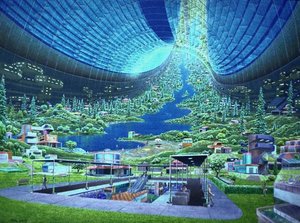Difference between revisions of "Space habitats"
From AdCiv
| Line 1: | Line 1: | ||
{{pagebg}} | {{pagebg}} | ||
{{backto|Colonising Space}} | {{backto|Colonising Space}} | ||
| + | [[Image:Stanford torus.jpg|300px|right]] | ||
| + | |||
| + | There are many places to site a habitat in space, especially local to Earth. | ||
| + | |||
| + | The easiest to get to from Earth is '''low earth orbit''', although due to the Earth's strong gravitational pull it requires enormous amounts of energy to bring material up from the surface and one could not be classed as self-sufficient here, however the views are pretty good. | ||
| + | |||
| + | In a '''geosynchronous orbit''' [http://en.wikipedia.org/wiki/Geosynchronous_orbit] the habitat would hover the same spot on Earth which would mean that one would have the same day / night cycle as on the surface which is an important consideration with human physiology. | ||
| − | |||
| − | |||
==Places== | ==Places== | ||
| − | |||
*Low Earth orbit | *Low Earth orbit | ||
*Higher earth orbits | *Higher earth orbits | ||
Revision as of 00:21, 21 September 2006
|

